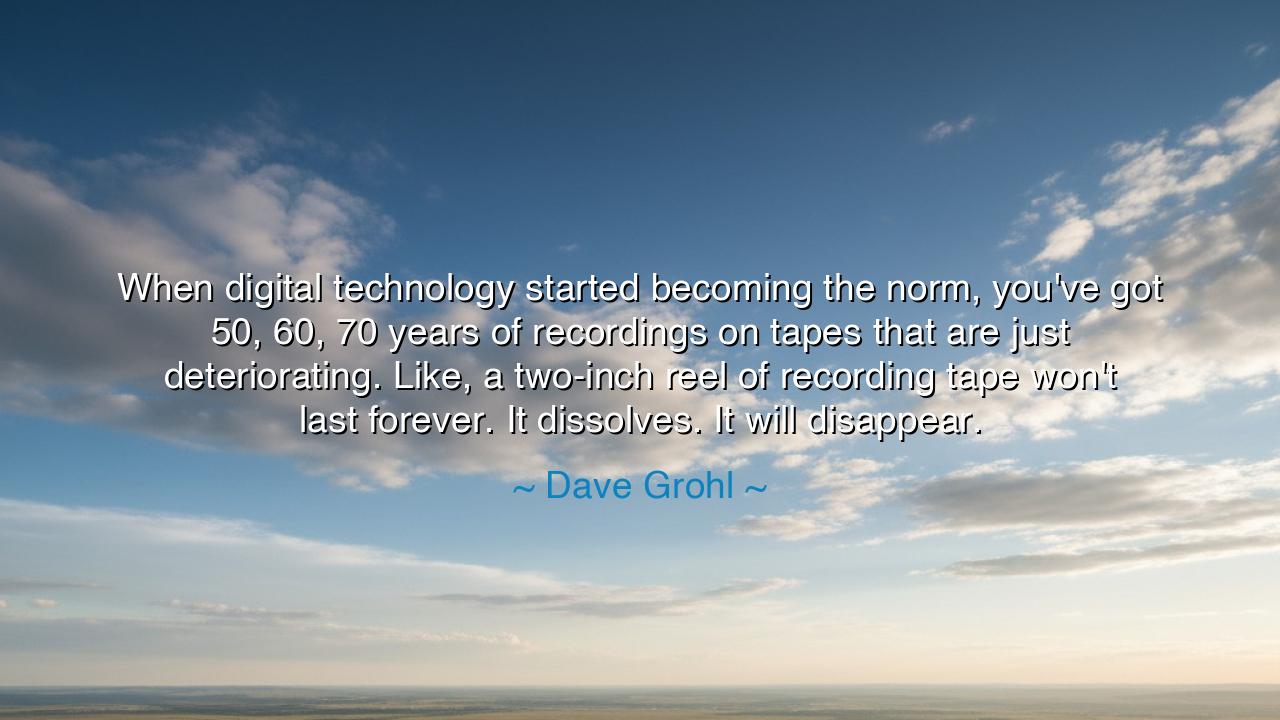
When digital technology started becoming the norm, you've got
When digital technology started becoming the norm, you've got 50, 60, 70 years of recordings on tapes that are just deteriorating. Like, a two-inch reel of recording tape won't last forever. It dissolves. It will disappear.






Dave Grohl, a keeper of sound and memory, once spoke with reverence and warning: “When digital technology started becoming the norm, you've got 50, 60, 70 years of recordings on tapes that are just deteriorating. Like, a two-inch reel of recording tape won't last forever. It dissolves. It will disappear.” These words, though rooted in music, echo with the gravity of history itself. For he speaks of the fragility of human creation, the fleeting nature of our treasures, and the duty of every generation to preserve the voices of the past before they are lost to silence.
He points first to digital technology, the new vessel of memory. Once, our music, our words, and our stories were pressed into fragile reels of magnetic tape. These tapes held decades of genius: the echoes of symphonies, the raw cries of rock and roll, the whispered poetry of folk. Yet Grohl warns that these physical relics are not eternal. The tape dissolves, the material decays, and with it vanishes the unrepeatable spark of the artist’s moment. His words remind us of the sorrowful truth: art, if not preserved, is as mortal as the body that created it.
This is no new struggle. In the ancient world, the Library of Alexandria stood as a beacon of knowledge, a treasury of scrolls holding the wisdom of centuries. Yet fire consumed it, and countless works of history, philosophy, and science were lost forever. Today we lament not only the flames but also the fragility of human preservation. Grohl’s lament for reels of recording tape is the modern echo of that same tragedy — that without foresight, the gifts of the past dissolve into dust, leaving future generations to inherit silence where there could have been song.
Yet from his words also arises hope. For just as the printing press saved words from the fragility of hand-copied manuscripts, so too does digital technology offer a chance to preserve music and sound beyond the limits of physical decay. The reel may crumble, but the recording, if carried into digital form, may endure. In this way, Grohl’s warning is also a call: to recognize that preservation is an active duty, not a passive inheritance. We must seize the tools of the present to guard the treasures of the past.
Consider the story of Alan Lomax, who journeyed across America with heavy equipment, recording the voices of folk singers and blues musicians in the 1930s and 40s. Many of these artists were unknown, their music never written down. Without his effort, their voices would have been lost forever. Today, those same recordings are studied and celebrated, shaping the very soul of American music. Lomax’s foresight was an act of patience and reverence — he captured life before it vanished. Grohl’s words echo this same urgency: record, preserve, digitize, or else the art of generations will disappear like mist at dawn.
The lesson is clear: all things of human hands are impermanent. Tapes dissolve, pages yellow, stone erodes. Yet with foresight and effort, we can preserve the essence of our culture. It is not enough to create; we must also guard creation. Grohl’s words are not only for musicians but for all: to recognize that memory must be nurtured, protected, and handed forward, or else it will vanish, and with it, the wisdom of ages.
Therefore, let the listener act: treasure the works of those who came before you. Support the preservation of music, art, and history. In your own life, do not let your creations languish unguarded — document them, share them, and preserve them. For as Grohl reminds us, the reels will dissolve, the tapes will vanish, but if we labor with care, the voices of the past will continue to sing in the ears of the future. And so the chain of memory will not be broken, but will endure, a song carried across the generations.






AAdministratorAdministrator
Welcome, honored guests. Please leave a comment, we will respond soon